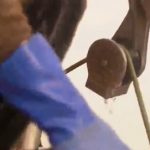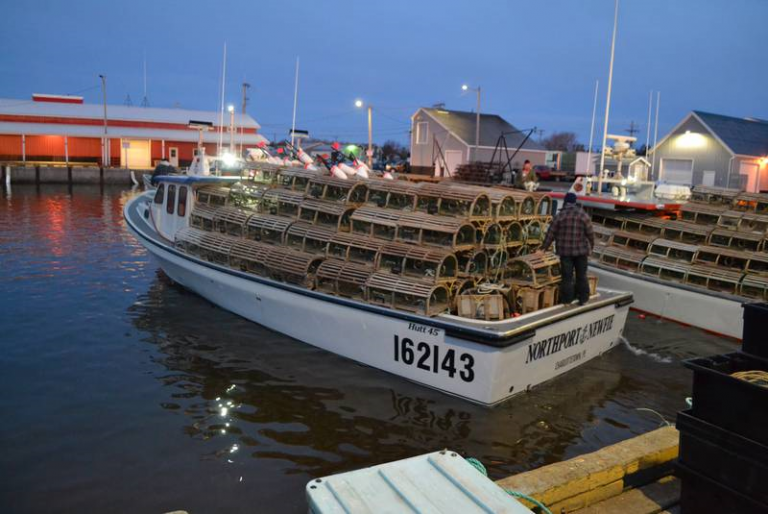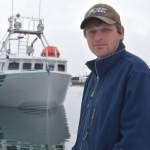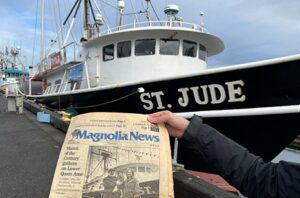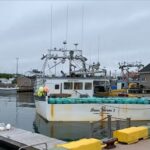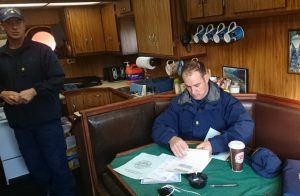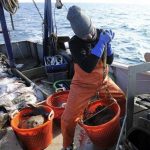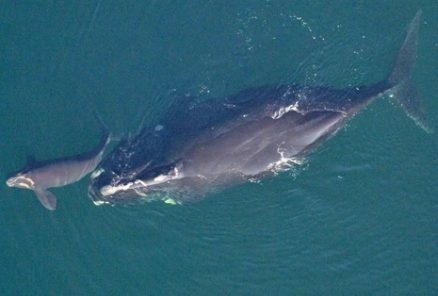Tag Archives: economics
Call for fishermen to join farmers’ protest
 Great Yarmouth skipper Paul Lines and Lowestoft fishmarket boss and former MEP June Mummery are calling on the fishing industry to back a farmers’ protest at Westminster next Tuesday, 19 November. The protest has been called following the announcement in the recent budget that farmland would no longer be exempt from inheritance tax but has rapidly moved to encompass wider concerns about food security. Paul Lines will be wearing wet-weather gear, including his sou’wester, to highlight the concerns of the fishing industry, and is calling on other fishermen to join him, if possible, similarly dressed. more, >>CLICK TO READ<< 07:40
Great Yarmouth skipper Paul Lines and Lowestoft fishmarket boss and former MEP June Mummery are calling on the fishing industry to back a farmers’ protest at Westminster next Tuesday, 19 November. The protest has been called following the announcement in the recent budget that farmland would no longer be exempt from inheritance tax but has rapidly moved to encompass wider concerns about food security. Paul Lines will be wearing wet-weather gear, including his sou’wester, to highlight the concerns of the fishing industry, and is calling on other fishermen to join him, if possible, similarly dressed. more, >>CLICK TO READ<< 07:40
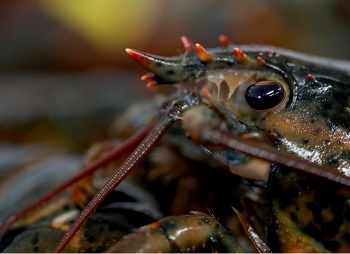
Long a lifeblood, South Shore fishing industry faces numerous challenges
Over his more than five decades fishing commercially, Frank Mirarchi has watched the business evolve from thriving and straightforward to complicated and diminished, with skyrocketing costs, foreign competition and changing regulations choking an industry synonymous with the South Shore. In the late 1960s, when he purchased his first of three successive boats, fish was abundant enough to make a solid living off of. “By 1985 or so, fishing was pretty bad,” Mirachi said. With profits dropping, he switched from having two other crew members to one. In 1994, the federal government stared limiting the number of days fishermen can be on the water to combat overfishing. Before, some spent 200 or more days fishing each year. Over the years, it was gradually reduced to 30. Mirarchi said this “wasn’t particularly successful”,,, >click to read< 08:54
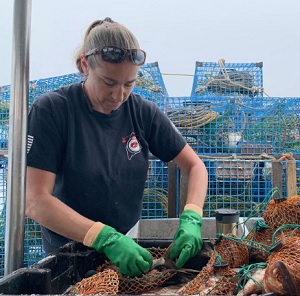
In Lobster Town U.S.A., When the industry suffers, the pain ripples.
Blaine Olsen, a lifelong lobsterman, was navigating his 30-foot boat off the coast of Stonington, Maine, when his sternman, who’s also his wife, yelled above the diesel engine’s din about the pittance the local cooperative was paying harvesters. He shot Ginny a doleful stare for a good five seconds. “Holy sh-t, man,” he said. “It costs us $600 a day to go out.” The dock price, $2.25 a pound for soft-shell lobsters, was half what it was a year ago, making it virtually impossible to earn a profit. The novel coronavirus has barely touched the public health of this corner of rural down east Maine, with Hancock County reporting just 16 cases and one death as of June 30. Its economic health is another matter,,, >click to read< 10:50
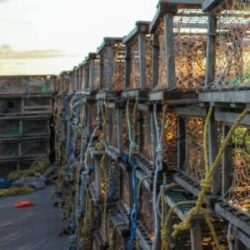
Tignish lobsterman Dryden Buote – Let us go fishing
There can be no doubt that a spring lobster fishery must take place this year in P.E.I. and will be viable, for those who are able to fish and have a place to sell their catches. The government has already announced what will be available to fishers who suffer a loss of income should they not be able to fish and sell their catches this season. (1) They may apply for a loan through Farm Credit Canada to supplement any loss of income and to pay for miscellaneous expenses they may have already incurred before their traps are even in the water. In addition this loan could be used to pay wages to those who work on boats as fisher’s helpers. I stress that this is a loan, money which will need to be paid back in the future. Do fishers need another payment in future years? I am admittedly no economist, but taking on more unnecessary debt does not seem to be a good business decision. (2) ,, >click to read< 15:55

How do you apply for small business funds from stimulus package?
Small businesses around the country got a $370 billion lifeline in the $2 trillion Coronavirus Aid bill,, But those businesses want to know what kind of relief will it provide? Dave Ketchen is the Harbert Eminent Scholar and Professor of Management at Auburn University, and he has been looking over the legislation. He said time is perhaps the biggest factor in question. “I definitely think it’s a much needed life preserver,” he said. “A big question is on the implementation side. If you throw a life preserver to somebody and they drown before they get it, it didn’t do them any good. A big question is how quickly is this money going to get into small business people’s hands.” >click to read< 14:47
Time to bring commercial fishing permits home to Alaska
 In 1983, the city of Angoon had 183 locally held fishing permits. Now, 32 years later, there are only 15 left. In Nome, 157 permits have become 89. In New Stuyahok, 144 permits have become 21. Larsen Bay’s 47 permits have dwindled to 15. These are not isolated incidents: this is a trend that can be found in every region of the state. This is a red-button moment. Each lost permit represents a small business shuttering its doors. The effects are devastating, especially in rural places where the opportunities to participate,,, Read the rest here 10:08
In 1983, the city of Angoon had 183 locally held fishing permits. Now, 32 years later, there are only 15 left. In Nome, 157 permits have become 89. In New Stuyahok, 144 permits have become 21. Larsen Bay’s 47 permits have dwindled to 15. These are not isolated incidents: this is a trend that can be found in every region of the state. This is a red-button moment. Each lost permit represents a small business shuttering its doors. The effects are devastating, especially in rural places where the opportunities to participate,,, Read the rest here 10:08
Seafood harvesting employment in Alaska is on the rise.
 A new report in the November edition of state Labor Department publication Alaska Economic Trends says monthly employment in Alaska’s seafood harvesting sector in 2013 grew by 2.4 percent, a level not seen since 2000. Job growth, primarily driven by increased salmon harvesting, brought the year’s monthly average of people employed in seafood harvesting to 8,393, less than 400 shy of 2000’s level,,, Read the rest here 09:09
A new report in the November edition of state Labor Department publication Alaska Economic Trends says monthly employment in Alaska’s seafood harvesting sector in 2013 grew by 2.4 percent, a level not seen since 2000. Job growth, primarily driven by increased salmon harvesting, brought the year’s monthly average of people employed in seafood harvesting to 8,393, less than 400 shy of 2000’s level,,, Read the rest here 09:09






 Most of the benefit from the commercial fishing industry goes to local government, while the state overspends itself, according to a new analysis. A study conducted by Bob Loeffler and Steve Colt of the University of Alaska Anchorage’s Institute of Social and Economic Research found that the state spends about $27.2 million more on commercial fishing than it receives in revenue from the industry. This includes regulation, operations and capital projects.
Most of the benefit from the commercial fishing industry goes to local government, while the state overspends itself, according to a new analysis. A study conducted by Bob Loeffler and Steve Colt of the University of Alaska Anchorage’s Institute of Social and Economic Research found that the state spends about $27.2 million more on commercial fishing than it receives in revenue from the industry. This includes regulation, operations and capital projects. 




























